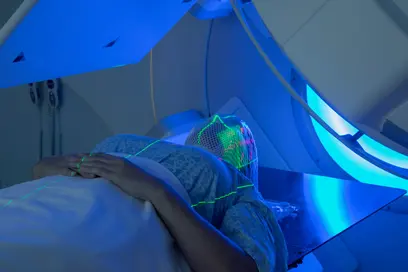In the genome of “non-small-cell lung cancer“, abbreviated to NSCLC, the most common malignant tumor in the lung, researchers often find characteristic carcinogenic changes. Some of these mutations produce specific growth signals and these cells therefore respond well to drugs that block the growth stimulus. One of these mutations bears the bulky name EML4-ALK. It is caused by an incorrectly repaired break in the DNA strand, which accidentally couples the ALK gene directly to the EML4 gene. The cell thereby produces large quantities of the cancer-promoting kinase ALK.
In these cases, doctors can stop cancer growth with inhibitors against ALK. Unfortunately, however, tumor cells often develop resistance to the inhibitors. Little is known about how this happens at the molecular level. “We know that not all EML4-ALK fusions are identical. They differ according to the proportion of the fused EML4 gene,“ explains Rocio Sotillo from the German Cancer Research Center. The scientist assumes that these differences are responsible for the different courses of the disease.
To find out, Sotillo and her team used the CRISPR-Cas gene scissors to produce three of the most important EML4-ALK fusion variants in the lungs of mice. In these animals, the researchers discovered that one of the variants, “No. 3“, has a particularly high potential to induce cancer: Cancer cells of variant No. 3 also rapidly develop resistance to ALK inhibitors and spread earlier into the body.
Sotillo and her team now want to equip human lung cancer cells in the culture dish with the various EML4-ALK variants and test whether variant No. 3 also leads to particularly aggressive tumors in humans. “We now have models that we can use to test different drugs and drug combinations so that we can finally better help patients with lung cancer,“ said Sotillo.
With the goal of promoting outstanding research in the field of EML4-ALK-fused lung tumors, Takeda Oncology has announced a top-class research award. Sotillo's project, which promises significant clinical improvements in personalized NSCLC therapy, won first prize, endowed with 30,000 euros.
After studying pharmacy, Sotillo received her doctorate from the Spanish National Cancer Center in Madrid in 2002. From 2003 to 2010, she worked as a research fellow at the Memorial Sloan Kettering Cancer Center in New York and from 2010 to 2015 at the European Molecular Biology Laboratory (EMBL) in Monterotondo. Since 2015, Sotillo has headed the department “Molecular Thoracic Oncology“ at the DKFZ.
A picture of Rocio Sotillo is available for download:
https://www.dkfz.de/de/presse/pressemitteilungen/2018/bilder/Sotillo-Rocio-1.jpg
Note on use of images related to press releases
Use is free of charge. The German Cancer Research Center (Deutsches Krebsforschungszentrum, DKFZ) permits one-time use in the context of reporting about the topic covered in the press release. Images have to be cited as follows: “Source: Jutta Jung/DKFZ“.
Distribution of images to third parties is not permitted unless prior consent has been obtained from DKFZ’s Press Office (phone: ++49-(0)6221 42 2854, E-mail: presse@dkfz.de). Any commercial use is prohibited.



